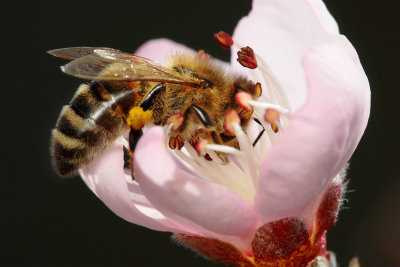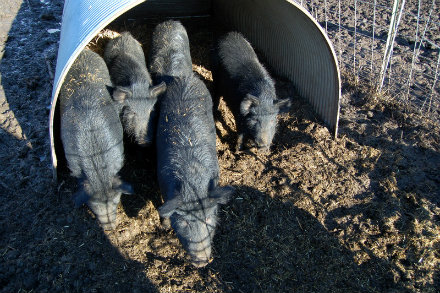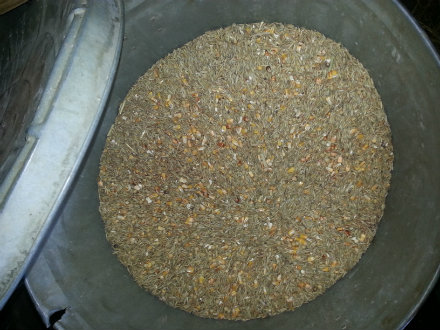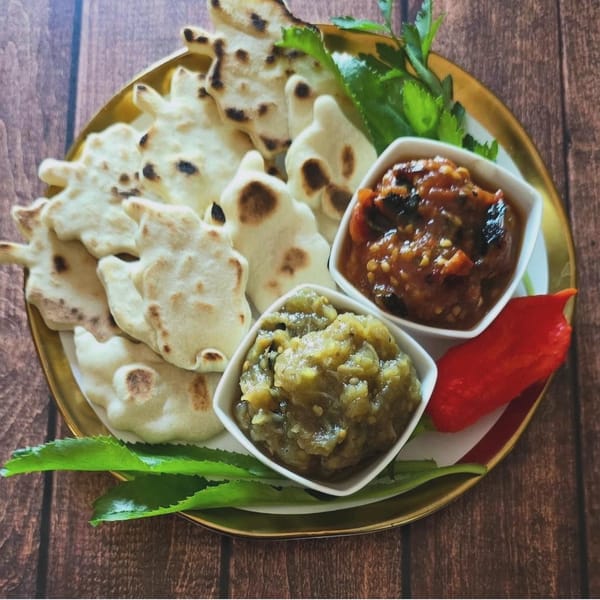AgriCulture bloggers Peter Davies and Mark Scherzer are the owners of Turkana Farms in Germantown, NY. This week Mark writes.

There's nothing like a late season snow storm to put visions of the blossoming trees, flowers, and buzzing insects of spring in one's head. Peter began on this bent last week even before the storm. When I arrived Friday to piles of wet snow, in my mind's eye I substituted a magnolia tree laden with saucer shaped blossoms for the puffy piles of snow blooming on its branches. Fortuitously, I had just read an article in The New York Times about bees and their attraction to varieties of nectar that contain caffeine and give them a buzz, so to speak. Apparently, several varieties of coffee and citrus plants bear flowers that produce nectar containing low levels of caffeine. Scientists at Newcastle University in England have conducted experiments that demonstrated that bees are far more likely to remember the connection between the odor of that plant and the reward of the nectar when that nectar contains caffeine, and therefore the bees are more likely to return to that plant. The Newcastle scientists studied the effect of caffeine on neurons in the bee's brain and found that it leads to more sensitivity in the Kenyon cells, the neurons involved in learning and memory. A similar effect has been demonstrated in laboratory rats. No evidence, apparently, that the bees and rats are kept up late at night.

This article helped settle an ongoing debate Peter and I have been having. In winter, when the rose bushes are buried in snow and I sometimes don't feel like venturing outside to dump coffee grounds on them, I often just put the old grounds in with the compost destined for the big pile by the barn. I have vehemently objected to Peter's practice of mixing the grounds in with other food scraps as part of our pig slop, on the supposition that coffee, like the citrus fruits that pigs really do not like, has no place in a porcine diet. Now recognizing the universality of the apparently pleasurable brain stimulating effects of caffeine throughout the animal kingdom, I'm going to concede the point to Peter. No, pigs don't need help staying alert at their desks — they seem plenty alert and active all the time — but why should I deny our pigs the pleasurable jolt of mental focus I derive from my morning cup of coffee? Coffee grounds in the pig slop will now be standard fare at Turkana Farms. Peter interjects here that, as usual, he is right. I obsequiously bow. The lesson of the coffee grounds was echoed for me in an article I read about sheep rumens a few weeks ago. This article, which I found while looking for remedies for diarrhea in lambs, pointed out that zealots for restricting sheep and cows to a grass-only diet, because grain is not a "natural" substance for ruminants to digest, are often exaggerating the animals' intolerance for grain. Grains often grow in fields where these ruminants graze. Grasses (and other pasture plants) have seed pods which are much like grains. Our staple grains all descend from grasses that one could call proto-grains. Ruminants eat such grass seeds all the time in small quantities, with no ill effects. And we know first hand the enthusiasm that sheep and cows have for fermented grain. Whenever we dump fermenting grain from the chicken coop floor or turkey shed onto the compost pile, we've learned to cover that grain with older compost immediately lest the sheep and cows, drawn by that sickly sweet scent, plow through or jump over the fence to get to that irresistible attraction.

I now realize that the happy feeling the sheep experience from that fermenting grain must be similar to the buzz a human (or a bee) gets from alcohol, which is so often fermented grain. Or that the cows get from the fermented hay in their baleage. I imagine that the sheep's enthusiasm for unfermented raw grains with a touch of molasses, which we give them in limited quantities as a daily treat, is like their cocktail hour, akin to the joys of having a beer or a scotch with some cheese and crackers at the end of the day. When the sun sinks toward the horizon and Orhan leads the flock up near the barn door to mill about, it has something of the atmosphere of a crowd awaiting the opening of happy hour at their neighborhood bar; A late afternoon decompression session. And I think that's just fine. If I can enjoy an early evening drink, why not my sheep? Or even my cows? Strict anti grain, pro-grass orthodoxy is, I've decided, a little too strict for our ruminants. No, I don't want a bunch of lushes just hanging around the barn slopping up the sauce all day, with all the ill health effects a heavy grain or fermented grain diet would likely bring them. But I want happy sheep and cows. And if we recognize the universality of happy reactions to substances like fermented grain and caffeine among all animals, ourselves included, we should not deprive them of such pleasures, in moderation, out of some misguided notion of diet purity. Live a little, my dear ruminants. As they say in New Orleans, let "les bons temps rouler!" Welcome to the Turkana Farms Happy Hour.








